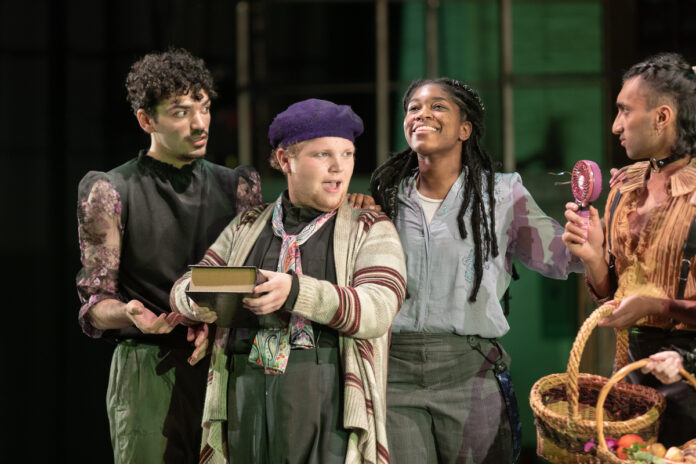
“Romeo and Juliet” is a play that has been performed ad nauseam. Countless iterations of the star-crossed lovers, with little to no creative liberty in the content of the story, only creativity in presentation. Director and visiting assistant professor of theatre, dance and directing at Muhlenberg, Nigel Semaj saw this void and decided to fill it with their transformative and breathtaking queer deconstruction of “Romeo and Juliet”— “Call Me By Any Other Name… Just As Sweet.”
The show lives up to its description of being a complete queer deconstruction of the original story: genders are different, new relationships emerge, even the ending is different. This all distinguishes this story from the norm, something that the show expresses by being “markedly queer” says Anna Item ‘25, who worked on the costume crew for “Call Me.”
I didn’t know how others would feel seeing the world for the first time – but people, including myself, really resonated with seeing queer and POC bodies centered in a narrative that usually excludes them.”
-Bridget Wiggan ’23
“Call Me” immediately set itself apart from previous adaptations of Shakespeare’s classic through its urban aesthetics, flashy costumes, use of modern colloquial language and, most of all, dance numbers. Semaj included dance numbers in the performance featuring a variety of modern songs that perform as scenes within themselves or interludes between scenes. Although it may seem like an off-putting alteration from the original play, the dance sequences do so much to further the plot and amplify emotions that words cannot fully express. From the feeling of love at first sight between Romeo and Juliet at the Capulet ball, to Juliet’s decision to commit suicide at the end, all are heightened through the use of dance in order to tell this age-old story in a new and engaging way.
The show, while being incredibly unique in its own way, still has familiar references hidden throughout. “It was really special… to experience the show and to see all of the references to queer culture that are embedded within it, and how that can be tied into storytelling that seems to exclude us, but actually doesn’t have to,” stated Anna Item ‘25. Within dance numbers, choreography referenced house and ball culture of urban queer youth; music choice employed hits by Lil Nas X, Teyana Taylor and Sam Smith; and added lines of dialogue alluded to queer subcultures such as those presented in RuPaul’s Drag Race. The individuality of this show stands out like a sore thumb covered in glitter and this individuality is only built up by the use of existing queer culture. These references allow those who identify with queer culture to find a safe space within this show, and to feel recognized and heard.
“Finding songs for my shows typically takes a while to pick, and when a song speaks to me and speaks to the text I just have to put it in the show in some way. For example, Arcade’s lyrics ‘Loving you is a losing game’ is the show summed up in one line of a song. I was on my way home one day and that song came across my Spotify and I just listened to it over and over and Juliet’s funeral came to mind and we choreographed it the next day in rehearsal.” Semaj said, describing their choices for music in the show.
Bridget Wiggan ‘23, who played Lady Montague and served as the dance captain, mentioned, “The production went amazingly well, which was gratifying considering how much time everyone put into the production. I honestly didn’t think it would have as much of an impact on the Muhlenberg community as it did, because while I loved the little details of the production after spending so much time in that world, I didn’t know how others would feel seeing the world for the first time – but people, including myself, really resonated with seeing queer and POC bodies centered in a narrative that usually excludes them. Also, it made Shakespeare accessible for once.”
One of the most important changes the play presents is the amount of diversity seen in the cast and crew of the production. The show features many actors of varying races, genders and sexualities that bring a new perspective to this typically cisgender, heterosexual, white story. Naava Wilson ‘25, a member of the chorus in the show, commented, “We had a really diverse cast… And I’m just glad people like this show, I hope people were like, ‘You know what? This? This is cool.’ We can have diverse shows and we can take things that originally we’ve only seen the same kind of people be in, and we can put other people in them and we can make [art] for everyone.”
Des Suarez ‘23, who played Juliet in the show also commented on her experience as a member of the cast saying that, “Working on this show was a special collaboration because as a student of color, this was the first space I was in where I had mates who looked like me or members of my family, and where my identity was truly cared for, and I hope the audience felt that open big gooey heart and felt a part of that in any way possible!”
“This play now, because we need to carve out more spaces for us to speak and to thrive and to live!” said Semaj in the program. “This play now, because the time is now for queer representation. This play now, because the time is now to decolonize our views on the classical literary canon and fill them with as many backgrounds and walks of life as possible. This play now, because the future is queer and there’s no stopping it… The choice is yours, but the time is now.”






















[…] Originally published at The Muhlenberg Weekly – https://muhlenbergweekly.com/arts-culture/call-me-by-any-other-name-just-as-sweet/ […]